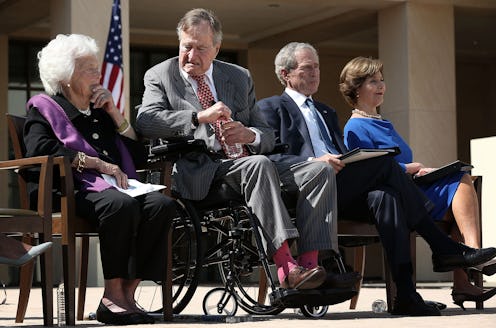News
Bush Presidents' Joint Charlottesville Statement Condemns Trump In A Weirdly Vague Way

On Saturday, thousands of white supremacists gathered in Charlottesville, VA. to protest the city's decision to remove a statue of the Confederate Gen. Robert E. Lee. The protesters chanted "white lives matter," and "the Jews will not replace us" while marching with torches. The rally turned deadly when a white supremacist drove a car into a smaller group of anti-racist counter-protesters, killing 32-year-old Heather Heyer. Following the violence at the white supremacist protest over the weekend, Presidents Bush Sr. and Jr. released a statement about Charlottesville decrying "racial bigotry, anti-Semitism, and hatred in all forms."
"As we pray for Charlottesville, we are reminded of the fundamental truths recorded by the city's most prominent citizen in the Declaration of Independence: we are all created equal and endowed by our Creator with unalienable rights. We know these truths to be everlasting because we have seen the decency and greatness of our country," read the statement from former presidents George H.W. Bush and George W. Bush.
The statement itself remained vague and avoided calling out President Trump's speech, in which he failed to denounce the white supremacists, instead blaming violence "on many sides."
"There are two sides to a story. I thought what took place was a horrible moment for the country, but there are two sides to a story," Trump told reporters on Tuesday at The Trump Tower, doubling down on his initial statement on Charlottesville that sparked intense backlash.
Trump also defended Confederate monuments and went on to ask, "This week it’s Robert E. Lee. I noticed that Stonewall Jackson is coming down. I wonder, is George Washington next week and is it Thomas Jefferson the week after? You really do have to ask yourself: 'Where does it stop?'"
In response to his latest comments, several Republicans have called out the ways Trump's response empowered white supremacy by not directly condemning it. Given the timing, it feels noticeable that the two presidents refrained from calling Trump out by name. Especially since Jeb Bush did so in a series of tweets on Tuesday.
"This is a time for moral clarity not ambivalence. I urge @POTUS to unite the country, not parse the assignment of blame for the events in Charlottesville. For the sake of our country, he must leave no room for doubt that racism and hatred will not be tolerated or ignored by the White House," wrote Jeb.
The statement from George W. and George H.W. looks fairly vague compared to Jeb's direct call out of Trump's refusal to condemn the rise of Nazi hate groups. Particularly, since Jeb wasn't alone. Even the House Speaker Paul Ryan called Trump's comments, saying there's no room for ambivalence. "We must be clear. White supremacy is repulsive. This bigotry is counter to all this country stands for. There can be no moral ambiguity," wrote Ryan on Twitter.